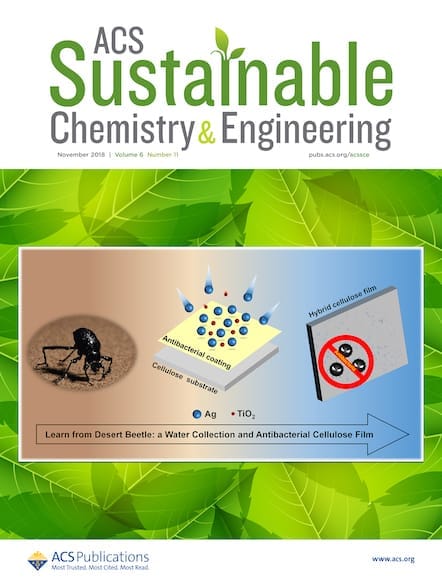Every ACS Sustainable Chemistry & Engineering reader appreciates what polymers have done to positively transform medicine, transportation, electronics, and beyond. Every reader also appreciates that the problems brought to human health and the environment by our traditional plastics are untenable and cannot continue unchanged. In this virtual special issue (VSI), you will find papers from […]

Every ACS Sustainable Chemistry & Engineering reader appreciates what polymers have done to positively transform medicine, transportation, electronics, and beyond. Every reader also appreciates that the problems brought to human health and the environment by our traditional plastics are untenable and cannot continue unchanged.
In this virtual special issue (VSI), you will find papers from leading groups from around the world on an incredible diversity of topics within the general space of “Degradable and Recyclable Polymers.” Material types explored in the issue include polyurethanes, cellulose, polyesters, novel enzymatically derived polysaccharides, and many more. The value chains for these materials are also quite varied, including packaging, adhesives, applications in apparel, and more. Finally, the studies will also give a broad view of the type of scientific work going on in this exciting and fast-changing field on the ways materials can help make the global economy more circular. Examples include studies on degradation mechanisms, new material synthesis, new applications for materials, and enzymes for recycling.
Because of the science represented in the papers in this VSI and the worldwide community of other researchers building on and extending this important work, a future materials portfolio that is designed to be degradable, recyclable, and healthful can be realized. In that way, we as a scientific community are preserving the best of what has been accomplished over the past century and eliminating the unintended adverse consequences. After all, isn’t that what sustainable chemistry and engineering are all about?
Learn more in the Degradable and Recyclable Virtual Special Issue Editorial.
Featured Articles:
Antibacterial and Soluble Paper-Based Skin-Attachable Human Motion Sensor Using Triboelectricity
ACS Sustainable Chem. Eng. 2020, 8, 29, 10786–10794
DOI: 10.1021/acssuschemeng.0c02542
Intrinsic Biodegradability of Plastics and Ecological Risk in the Case of Leakage
ACS Sustainable Chem. Eng. 2020, 8, 25, 9239–9249
DOI: 10.1021/acssuschemeng.0c01230
Enzymatic Polymerization Routes to Synthetic–Natural Materials: A Review
ACS Sustainable Chem. Eng. 2020, 8, 27, 9947–9954
DOI: 10.1021/acssuschemeng.0c01664
Hydrolyzable Biobased Polyhydroxyurethane Networks with Shape Memory Behavior at Body Temperature
ACS Sustainable Chem. Eng. 2020, 8, 24, 9125–9135
DOI: 10.1021/acssuschemeng.0c02610
Current State and Perspectives Related to the Polyethylene Terephthalate Hydrolases Available for Biorecycling
ACS Sustainable Chem. Eng. 2020, 8, 24, 8894–8908
DOI: 10.1021/acssuschemeng.0c01638
Effective Control against Broadleaf Weed Species Provided by Biodegradable PBAT/PLA Mulch Film Embedded with the Herbicide 2-Methyl-4-Chlorophenoxyacetic Acid (MCPA)
ACS Sustainable Chem. Eng. 2020, 8, 13, 5360–5370
DOI: 10.1021/acssuschemeng.0c00991
“From the Nature for the Nature”: An Eco-Friendly Antifouling Coating Consisting of Poly(lactic acid)-Based Polyurethane and Natural Antifoulant
ACS Sustainable Chem. Eng. 2020, 8, 3, 1671–1678
DOI: 10.1021/acssuschemeng.9b06917
Sustainable Triblock Copolymers as Tunable and Degradable Pressure Sensitive Adhesives
ACS Sustainable Chem. Eng. 2020, 8, 32, 12036–12044
DOI: 10.1021/acssuschemeng.0c03158
Synthesis of Linear Polyesters from Monomers Based on 1,18-(Z)-Octadec-9-enedioic Acid and Their Biodegradability
ACS Sustainable Chem. Eng. 2020, 8, 45, 16853–16860
DOI: 10.1021/acssuschemeng.0c05671
Multiple Hydrogen Bonding Enables Strong, Tough, and Recyclable Soy Protein Films
ACS Sustainable Chem. Eng. 2020, 8, 20, 7680–7689
DOI: 10.1021/acssuschemeng.0c01333
Degradation Behavior of Biobased Epoxy Resins in Mild Acidic Media
ACS Sustainable Chem. Eng. 2021, 9, 1, 438–447
DOI: 10.1021/acssuschemeng.0c07621
